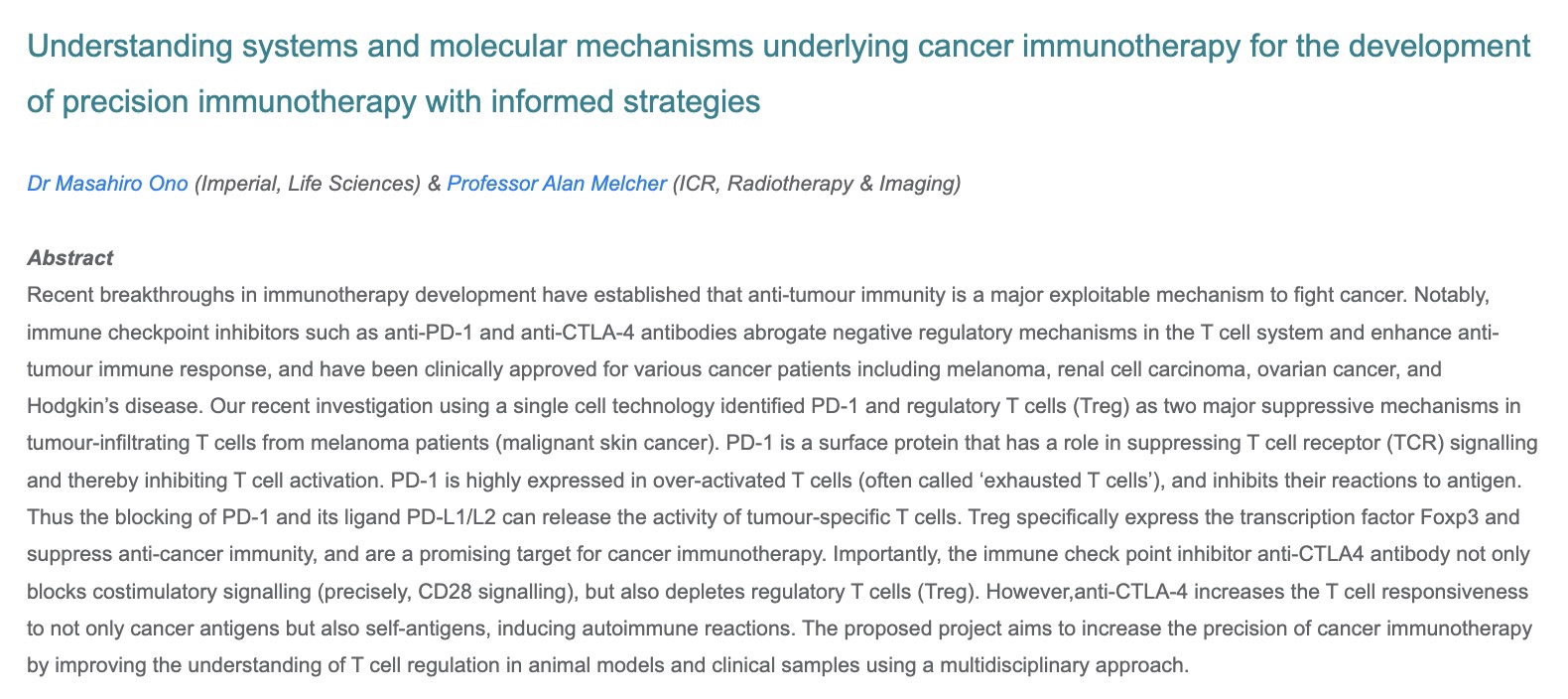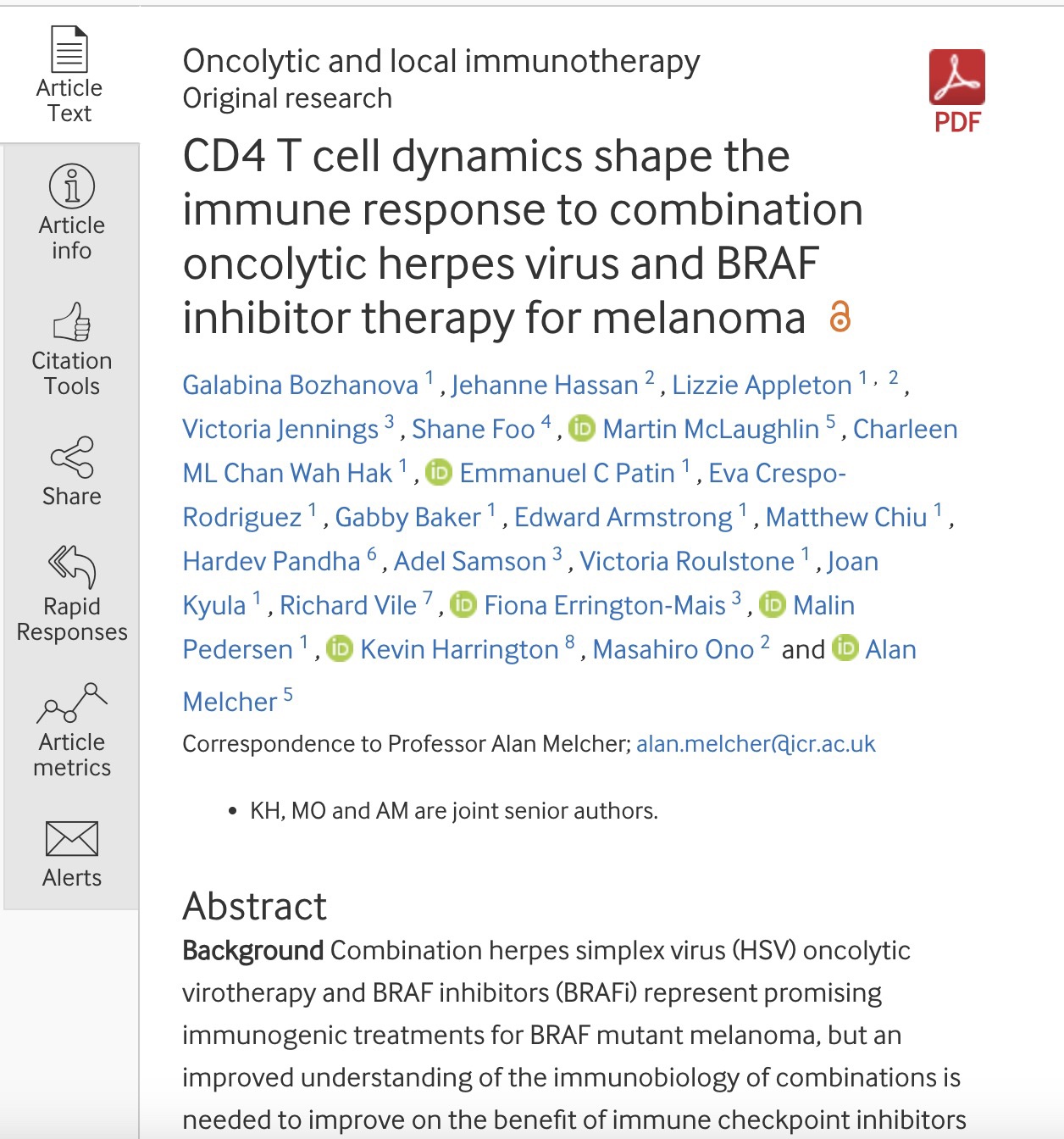tocky illuminates mechanisms of immune checkpoint blockade
In 2017, after successfully developing the Tocky technology and the data transformation method for Tocky data, I began submitting our first Tocky papers. Around the same time, I launched a new cancer immunotherapy project that utilized the capabilities of Tocky technology.
A Pump Priming Collaborative Grant 2017
In 2016, I initiated discussions about a new cancer immunotherapy project with my collaborators at the Institute for Cancer Research, Prof Alan Melcher and Prof Kevin Harrington.
These discussions led to securing a pump-priming grant from the Cancer Research Centre of Excellence (CRCE, now known as the CRUK Convergence Science Centre). The grant, which was for a one-year project starting in September 2017, marked a significant milestone. It enabled us to commence a project focused on investigating the effects of immune checkpoint blockade on cancer-reactive T cells, utilizing tools such as Nr4a3-Tocky and Foxp3-Tocky.
A PhD studentship 2019
The next stage of our cancer research endeavor involved applying for a PhD studentship from the Convergence Science Centre to study immune checkpoint inhibitors, specifically PD-1 blockade. This application was successful, leading to the launch of a new PhD studentship project dedicated to investigating the mechanisms of immune checkpoint blockade using the Tocky tools.

This project aimed to enhance the precision of cancer immunotherapy by exploring T cell regulation mechanisms in melanoma patients. With the establishment of Tocky technology, the project focused on two critical immune suppressors: PD-1 and regulatory T cells (Treg). It sought to reveal the mechanisms behind anti-PD-1 and anti-CTLA-4, which have become standard treatments in malignant melanoma and other cancers.
CRUK Programme Foundation Award 2021
In pursuit of substantial funding to fully launch my cancer immunotherapy project, I encountered several challenges. Despite these struggles, my persistent efforts culminated in a successful application for a CRUK Programme Foundation Award (PFA).
The pivotal interview for this award took place on March 10, 2020, just before the onset of the first lockdown in the UK.

I left the interview with a positive feeling, but I had to wait for the announcement of the results, which was unusually delayed by almost a year due to the pandemic.
First Collaboration Paper Published 2021
In the meantime, our first collaborative paper on cancer immunotherapy with the Institute for Cancer Research (ICR) was successfully published in 2021 (Bozhanova et al., 2022). This study explored the mechanism of an oncolytic virus therapy using Nr4a3-Tocky technology.

First Preprint Released in July 2022
Our first study on cancer immunotherapy, focusing on immune checkpoint blockade, was made available as a preprint in July 2022(Hassan et al., 2022). This was more delayed than anticipated due to the challenging periods during the pandemic and personal circumstances. Still, this was an important milestone for us.
This research explored the mechanisms of the anti-PD-L1 and anti-CTLA-4 antibodies using Nr4a3-Tocky technology. The findings led us to hypothesize and test the anti-OX40 antibody, which demonstrated significant additive effects on anti-cancer T-cell activities.
I am grateful to my great collaborators, Prof Alan Melcher and Prof Kevin Harrington at ICR, and Prof Taku Okazaki, who is a renowned expert in PD-1 and Lag-3 biology.

The endeavor has just begun. We anticipate being able to discuss the full scale of our cancer immunotherapy project within this blog very soon.

References
2022
- CD4 T cell dynamics shape the immune response to combination oncolytic herpes virus and BRAF inhibitor therapy for melanomaJournal for ImmunoTherapy of Cancer, Sep 2022
- Single-cell level temporal profiling of tumour-reactive T cells under immune checkpoint blockadebioRxiv, Sep 2022
Enjoy Reading This Article?
Here are some more articles you might like to read next: